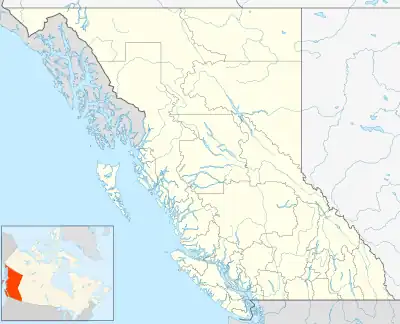Palliser | |
|---|---|
 Palliser Location of Palliser in British Columbia | |
| Coordinates: 51°14′59″N 116°43′04″W / 51.24972°N 116.71778°W | |
| Country | Canada |
| Province | British Columbia |
| Region | East Kootenay |
| Regional District | Columbia-Shuswap |
| Area codes | 250, 778, 236, & 672 |
| Highways | |
Palliser is a railway point which straddles the shores of the Kicking Horse River in the East Kootenay region of southeastern British Columbia.[1] This ghost town, off BC Highway 1, is by road about 36 kilometres (22 mi) southwest of Field and 21 kilometres (13 mi) southeast of Golden.
Name origin
Although named after John Palliser, leader of the Palliser expedition, he never visited this area. Sir James Hector, another member of the party, explored this valley.[2]
Railway
The westward advance of the Canadian Pacific Railway (CP) rail head passed through Palliser around September 1884.[3][4]
In 1906, the completion of the Palliser Tunnel about 2.4 kilometres (1.5 mi) west of Palliser eliminated a 23-degree curve.[5] At this location in 1884, a 150-metre (500 ft) tunnel was completed, but collapsed in 1887. A diversion created the sharp curve and three smaller curves. For safety, passenger cars were clamped together to prevent uncoupling.[6] The new tunnel was 212 metres (694 ft) in length.[7]
In 1905, another tunnel was completed[8] about 0.8 kilometres (0.5 mi) east of Palliser. In 1921, an eastbound freight train struck a cave-in along the 94-metre (310 ft) curve. Seven crew were killed, and three hours later, the wreck burst into flames. Traffic was diverted over the Kootenay Central and the Crowsnest Pass until three trestle bridges and 1,100 metres (3,700 ft) of new track were built around the tunnel.[9]
The present passing track is 2,753 metres (9,032 ft) long.[10]
| Train Timetables (Regular stop or Flag stop) | ||||||||||||
|---|---|---|---|---|---|---|---|---|---|---|---|---|
| Mile | 1887 | 1891 | 1898 | 1905 | 1909 | 1912 | 1916 | 1919 | 1929 | 1932 | 1935 | |
| [11] | [12] | [13] | [14] | [15] | [16] | [17] | [18] | [19] | [20] | [21] | [11] | |
| Donald | 51.5 | Regular | Regular | Regular | Flag | Flag | Flag | Flag | Flag | Flag | Flag | Flag |
| Forde | 47.5 | Flag | Flag | Flag | Flag | Flag | ||||||
| Moberly | 41.5 | Flag | Flag | Flag | Flag | Flag | Flag | Flag | Flag | Flag | Flag | Flag |
| Golden | 35.0 | Regular | Regular | Regular | Regular | Regular | Regular | Regular | Regular | Regular | Regular | Regular |
| Glenogle | 27.8 | Flag | Flag | Flag | Flag | |||||||
| Palliser | 22.5 | Regular | Regular | Regular | Regular | Regular | Flag | Flag | Flag | Flag | ||
| Leanchoil | 17.0 | Flag | Flag | Both | Flag | Flag | Flag | Flag | Flag | Flag | Flag | Flag |
| Misko | 12.5 | Flag | Flag | |||||||||
| Ottertail | 8.2 | Regular | Flag | Flag | Flag | Flag | Flag | Flag | Flag | |||
| Emerald | 4.1 | Flag | ||||||||||
| Field | 0.0 | Regular | Regular | Regular | Regular | Regular | Regular | Regular | Regular | Regular | Regular | Regular |
Early community
By 1889, Wilmer Cleveland Wells operated a sawmill.[22] By 1890, a general store and hotel were also present.[23] A post office existed 1894–1914.[24] The store was short-lived, but a hotel accommodated visitors into the early 1900s.[25]
In 1901, a Pinkerton Detective agent tracked a bank robber to the community.[26] That year, the population peaked at about 100.[27] The sawmill closed about 1908 but a watchman remained until the completion of clearing the site around 1915.[25] The 1911 Census lists eight residents.[28][29] By 1918, the place was deserted.[30]
Maps
- "Kootenay map". library.ubc.ca. 1899. p. 1.
- "BC map". www.davidrumsey.com. 1925.
Footnotes
- ↑ "Palliser (railway point)". BC Geographical Names.
- ↑ Palumbo 2000, p. 288.
- ↑ "Daily Colonist". archive.org. 6 Jun 1884. p. 2.
- ↑ Backler 1981, p. 89 (76).
- ↑ "Week". library.ubc.ca. 19 May 1906. p. 5.
- ↑ Backler 1981, p. 235 (222).
- ↑ Backler 1981, p. 236 (223).
- ↑ "Cranbrook Herald". library.ubc.ca. 21 Sep 1905. p. 2.
- ↑ "Golden Star". goldenbcmuseums.com. 15 Oct 1921.
- ↑ "Mountain Subdivision". www.okthepk.ca.
- 1 2 "Timetable". library.ubc.ca. 28 Apr 1935. p. 3 (TT 70).
- ↑ "Timetable". www.library.ubc.ca. May 1887. p. 11 (18).
- ↑ "Timetable". www.library.ubc.ca. 15 Jun 1891. p. 78 (39).
- ↑ Timetable, 18 Mar 1898 , p. RA2-PA45, at Google Books
- ↑ "Timetable". www.library.ubc.ca. 8 Oct 1905. p. 49 (12).
- ↑ "Timetable". www.library.ubc.ca. 1 Sep 1909. p. 72.
- ↑ "Timetable". www.library.ubc.ca. 1 Dec 1912. p. 85 (TT6).
- ↑ "Timetable". library.ubc.ca. 5 Sep 1916. p. 147 (TT10).
- ↑ "Timetable". library.ubc.ca. 30 Nov 1919. p. 170 (TT10).
- ↑ "Timetable". library.ubc.ca. 1929. p. 11 (TT9).
- ↑ "Timetable". library.ubc.ca. 25 Sep 1932. p. 461 (TT78).
- ↑ "1889 BC Directory". www.bccd.vpl.ca.
- ↑ "1890 BC Directory". www.bccd.vpl.ca.
- ↑ "Postmasters". www.bac-lac.gc.ca.
- 1 2 Palumbo 2000, p. 289.
- ↑ "Golden Era". library.ubc.ca. 10 May 1901. p. 4.
- ↑ "1901 BC Directory". www.bccd.vpl.ca.
- ↑ "1911 Census". automatedgenealogy.com. p. 7.
- ↑ "1911 Census". automatedgenealogy.com. p. 8.
- ↑ "1918 BC Directory". www.bccd.vpl.ca.
References
- Backler, Gary G. (1981). The C.P.R.'s capacity and investment strategy in Rogers Pass, B.C., 1882–1916. www.library.ubc.ca (MSc).
- Palumbo, Colleen (2000). 2000 Golden Memories. Golden and District Historical Society. ISBN 1-55056-715-2.